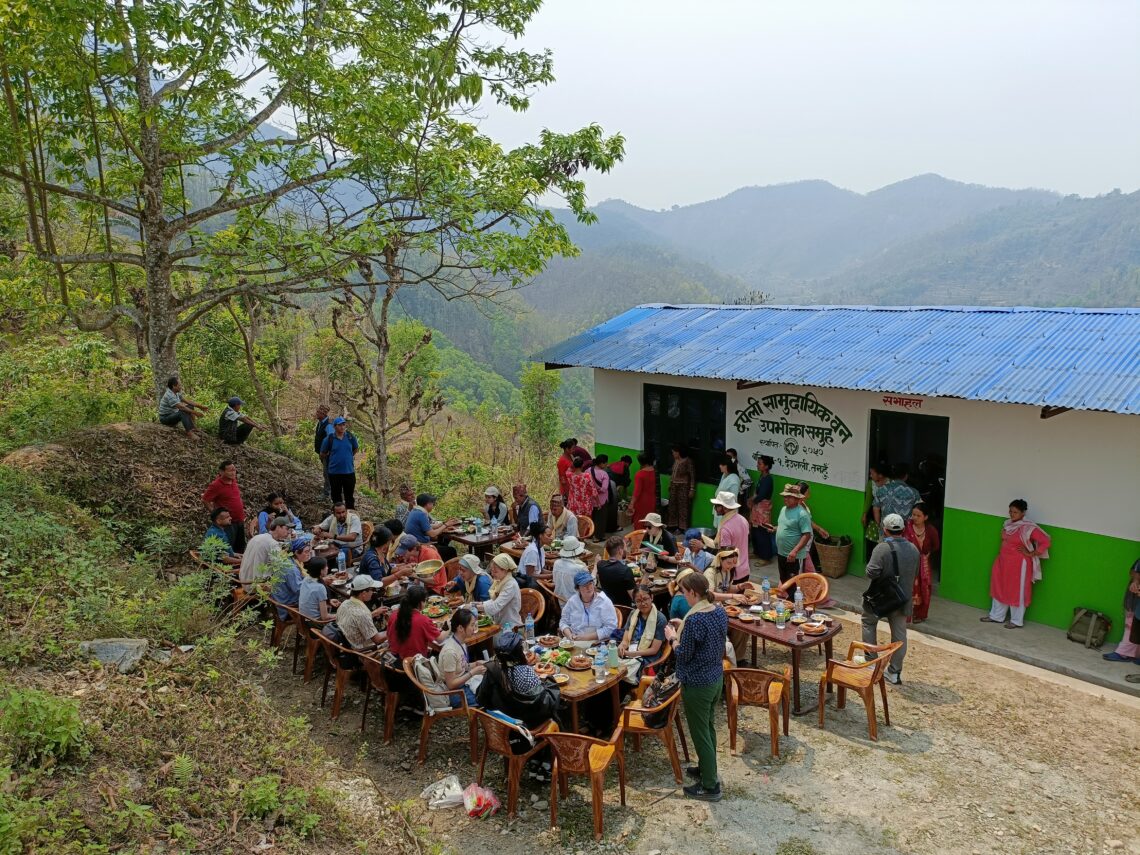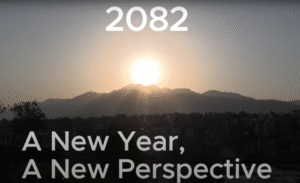This course is a compulsory part of the Masters in Environment and Development at the University of Edinburgh. It takes place following semester 1 courses that introduce students to theories and academic work on environmental justice, critical development studies, and reflective praxis; ‘Development and Justice’ and ‘Environmental Justice and Development’. It also builds on our semester 2 course in which students learn directly from practitioners working across the environment and development sector to gain practical skills and tools, as well as discuss the ethics of engagement in an unequal world; ‘Professional Skills in Environment and Development’. In our course ‘Environment and Development ‘In the Field’, students have the opportunity to put everything that have learnt in the classroom in Edinburgh into practice, whilst visiting a country in the Majority World. Before setting off on the course trip though, students are introduced to the history, geography and culture of the country, some of the environment and development challenges experienced there, and importantly some language skills, so that they can introduce themselves and engage in conversations with those we meet.
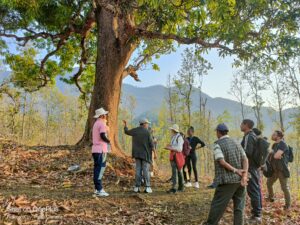
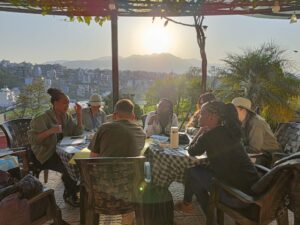
During the course trip we meet with people from government, civil society, international NGOs, research-for-development organisations, place-based community-based natural-resource management groups, academics, and many more. We visit the places they work and live in, hear about the projects they are conducting, and get to see the practices of resource governance they engage in. Students also complete a group research project, working alongside colleagues and partners from the country, and presenting reflections and insights from that to those we have met. We make time every day during the trip to sit together and reflect on what we have been seeing, hearing and feeling, in order to collectively process and make sense of our experiences and learnings. After the trip, students write individual reflective essays in which they articulate their experience and learning journey.
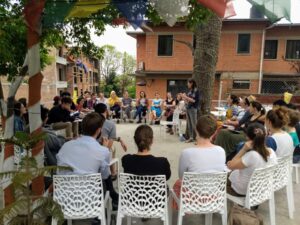
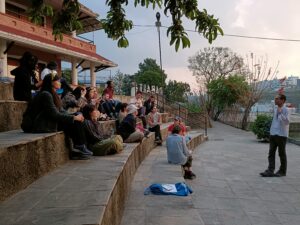
Since 2019 this course trip has visited Nepal, where we partner with the amazing organisation Southasia Institute of Advanced Studies (SIAS). SIAS is the leading research organisation and policy think tank focusing on a range of environment and development issues across Nepal. Not only are they our logistical partner (arranging our accommodation, travel, visits and research activities whilst in Nepal), but we learn from them how to embody engaging with people on environment and development issues with curiosity, care, compassion, humility and a sense of joy.
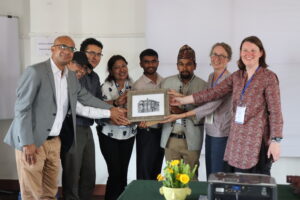
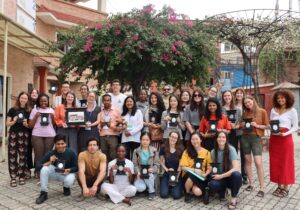
In this course we directly question and reject the colonial, masculinist, explorer presumptions of access to ‘the field’, and instead seek to better understand and attempt to embody ‘access as love’ (Guasco 2022) as we visit the country, communities and contexts that we encounter. Each year we reflect on what the trip has meant to us in that regards, and you can read blogs written by students and staff, which capture some of this reflection below.
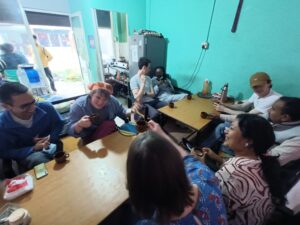
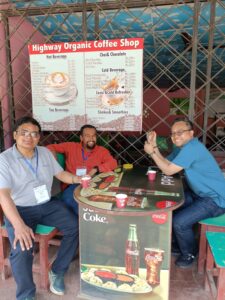
In 2025 two of our amazing students, Panayiotis Louca and Františka Vosátková, created an incredible film featuring footage from Nepal and other students reflecting on the trip once back in Edinburgh:
2082: A NEW YEAR, A NEW PERSPECTIVE
You can watch it by clicking “Accept and view” on the image below (or watching on YouTube here).
Blogs written by students and staff over the years can be read here, hosted on the SIAS webpages:
2025
- Nepal and the Path Back to Hope: On Emotion, Self-Reflection, and ‘Development’ by Shabira Damarti
- Because I Can, Should I? Reflections on Conservation, Reciprocity, and Justice from Fieldwork in Nepal by Daniela Soberon Garreta
- Going There: An Emotional Perspective Of Nepal Field Trip by Trace Mdamu
- Critical Hope as a Living Practice: Student Reflections from a Nepal Field Trip by Trace Mdamu (Tanzania), Sharon Wambete (Kenya), Sanjeev Paneru (Nepal), Camil Guo (China), Sitong Shen (China), Panayiotis Louca (Cyprus), Esther Githinji (Kenya)
2024
- The “Fu Ming” People – To the Idealists of Sias and All Those in Nepal by Yuequi Sun
- Learning Love/Love as Learning: Reflections on Another Year’s Student Trip to Nepal by Sam Staddon
2023
- “Access is love”: Justifying and practicing ‘fieldwork’ bringing UK Masters students to Nepal by Sam Staddon
[break due to the pandemic]
2020
- Impacts of COVID-19 on Collaborative Fieldwork: A Toolkit for Global Engagement by Allison Wilkerson
- Students fieldtrip in a time of COVID-19 – Reflections on a remote ‘Nepal Experience’ and an Ethics of Care by Sam Staddon
2019
- You and I are no different by Fleur Nash
- Beyond informative : When Learning Becomes Transformative by Peter Rowe
- On Nepal: Fieldwork Reflections by Sonya Manchanda Peres
- Mutual learning experience by Parbati Pandey, Masters Student from Nepal
- Transformative learning through fieldwork and collaborations by Sam Staddon
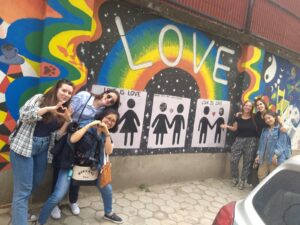
Staff on the course trip have also written an academic paper about the learning experience from the course, based on our trip in 2019, and you can read that open access article online here:
- Staddon, Barnes, Lai, Scazza & Wilkie (2021) A ‘Token Of Love’: The Role of Emotions in Student Field Trips Teaching Critical Development Geographies. Journal of Geography in Higher Education. 47(5), 839–856.
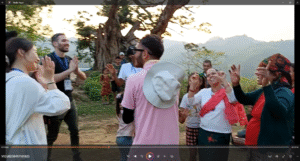
Over the years, we have met incredible people from the following places and organisations, and we would like to offer here a huge DHERAI DHANYABHAD to them all, for enabling us such a wonderful learning experience:
- Annapurna Conservation Area Project (ACAP)
- Chapeli Community Forest User Group
- Dibya Devi Gurung
- Dhulikhel Municipality
- Federation of Community Forest User Groups Nepal (FECOFUN)
- ForestAction
- Gandaki Urja
- Ghandruk village
- ICIMOD Living Mountain Lab
- Institute of Forestry
- International Water Management Institute (IWMI)
- Jaibik Shroth Samparkha Abhiyan
- Local Initiatives for Biodiversity, Research and Development (LI-BIRD)
- Lumle Agriculture Research Centre
- Lwang village
- Ministry of Forests and Environment (MoFE)
- National Trust for Nature Conservation
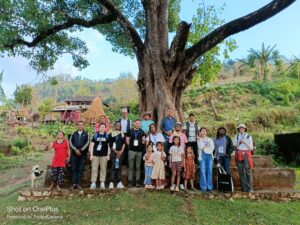
When we stay in Kathmandu, we are hugely privileged to stay at Tewa, which is Nepal’s first women’s fund; it works towards empowering women, girls and LBT, and building a self-reliant women’s movement in Nepal.
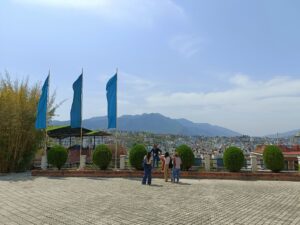
The trip’s success is down to the curiosity, compassion and openness of our amazing Masters students, and we wish to thank them all here, for making the trips such a joy for all involved – as staff, we have loved learning with you, crying with you, and dancing with you over the years. We also thank our PhD tutors on the trip, who bring so much to the trip, and everyone’s learning experiences. At SIAS, our special thanks go to the incredible Sanjaya Khatri, and to Sushant Acharya, Gyanu Maskey, Salu Basnett, Kaustuv Raj Neupane and Kamal Devkota.
The course involves the following University of Edinburgh staff: Clare Barnes, Regina Hansda and Sam Staddon. If you would like to find out more, please email: sam.staddon@ed.ac.uk
![]()

You might also be interested in related action research work on Collective Reflective Learning for Social Justice in Nepal: https://blogs.ed.ac.uk/collective-reflective-learning-for-social-justice-in-nepal/
